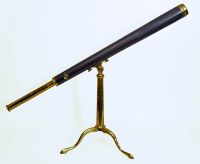
In the late evening, Thomas Jefferson retired to his private suite of rooms, what one guest called his "sanctum sanctorum." The suite arrangement was a feature he had seen in France, and consisted of four connected rooms: his bed chamber; his Cabinet office, his library, and the greenhouse work room. In these rooms, Jefferson pursued any of several activities, ranging from architecture and astronomy to the more mundane, accounting.
Architecture: "One of My Favorite Amusements"
Jefferson was a self-taught architect who learned the art by studying books on the subject. He particularly admired the work of the Renaissance Italian Andrea Palladio, whose Four Books of Architecture Jefferson reportedly referred to as "the Bible." Among Jefferson's first creations was the original Monticello, which he later significantly revised. In addition, he designed the Virginia State Capitol, planned the University of Virginia, and worked with Pierre Charles L'Enfant to create the city plan for Washington, D.C.
Science: "My Supreme Delight"
Jefferson also used the Cabinet for experiments, claiming that "Nature intended me for the tranquil pursuits of science, by rendering them my supreme delight." Jefferson read widely in the sciences, and corresponded frequently with enthusiasts worldwide. His Cabinet was filled with devices for observing, measuring, and recording nature. Influenced by Enlightenment thinkers like Sir Isaac Newton, Jefferson believed that a rational system of order governed the natural world, and that by applying these rules of science, the condition of man could be improved.
 Fascinated with almost every aspect of science, Jefferson was particularly interested in those fields like astronomy, which were informed "by the aid of mathematical calculation," perhaps because he noted that "No two men can differ on a principle of trigonometry." As Secretary of State, Jefferson established America's decimal system of currency, and argued unsuccessfully for the adoption of a decimal system of weights and measures. President of the American Philosophical Society for seventeen years and the only American of his time to be elected as a foreign associate of the Institute of France, Jefferson was known internationally as a man of learning. Today he is recognized, in the late Jefferson scholar Dumas Malone's words, "as an American pioneer in numerous branches of sciences, notably paleontology, ethnology, geography, and botany."
Fascinated with almost every aspect of science, Jefferson was particularly interested in those fields like astronomy, which were informed "by the aid of mathematical calculation," perhaps because he noted that "No two men can differ on a principle of trigonometry." As Secretary of State, Jefferson established America's decimal system of currency, and argued unsuccessfully for the adoption of a decimal system of weights and measures. President of the American Philosophical Society for seventeen years and the only American of his time to be elected as a foreign associate of the Institute of France, Jefferson was known internationally as a man of learning. Today he is recognized, in the late Jefferson scholar Dumas Malone's words, "as an American pioneer in numerous branches of sciences, notably paleontology, ethnology, geography, and botany."
Accounting: "A Miserable Arithmetic"
Jefferson may also have devoted time in the evening to his finances. He was a careful accountant, utilizing the double-entry system in his highly detailed ledgers. Unfortunately, Jefferson's debts, initially inherited from his wife's father, increased throughout his life, leading him to describe his accounts as "a miserable arithmetic." In his last years Jefferson wrote that he was "over whelmed at the prospect of the situation in which I may leave my family." Despite efforts to protect the house, Jefferson's debts caused Monticello and its contents to be sold after his death.
Reading: "I Cannot Live without Books"
Perhaps Jefferson's favorite evening activity was reading. He wrote to John Adams, "I cannot live without books," and throughout his life, he collected almost 9,000 volumes. Preferring the classics, he read in seven languages and made it a rule "never to read translations where I can read the original."
Commenting on his daily routine, he wrote: "I never go to bed without an hour, or half hour's previous reading of something moral, whereon to ruminate in the intervals of sleep." For Jefferson, this moral reading might have been his own extracts from the Gospels, "The Life and Morals of Jesus of Nazareth."
In 1819, at the age of seventy-six, Jefferson wrote that he slept "five to eight hours, according as my company or the book I am reading interests me."



